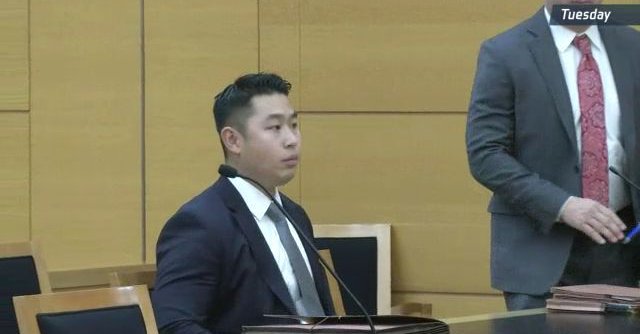
Arguments came to a close today in the trial against NYPD officer Peter Liang, charged with manslaughter and two counts of official misconduct in the shooting death of Akai Gurley, who was unarmed and visiting a friend at the time he was killed.
Two weeks of evidence came to a close when Liang took the stand to tearfully testify that he pulled the 11.5-pound trigger of his service weapon and a fired a shot into the darkened stairwell of a residential building when he was “startled” by an unknown, and that he failed to give CPR when confronted by a dying Gurley in the stairwell of the Louis H. Pink Houses because he didn’t feel like he had sufficient training to perform the life-saving measures and that Gurley’s friend — who had never learned CPR — would be better for the task. As for why he never called for help, Liang’s defense claims that his call for an ambulance was never recorded in official transcripts of the incident because reception in the stairwell was “spotty”.
Prosecutors summarized their case in the closing remarks by saying:
“It’s not true that this was a one in a million shot,” Assistant District Attorney Joe Alexis said. “Peter Liang fired a shot right at where Akai Gurley stood because he heard a sound on the seventh floor. An innocent man is dead because he heard a sound, a sound he can’t even describe.”
Joe Alexis: "#PeterLiang heard a noise and instead of pointing his flashlight, he pointed his gun and pulled the trigger." #AkaiGurley
— Mary Ann Georgantopoulos (@marygeorgant) February 9, 2016
Reporters who have been live-tweeting the case for the last two weeks now reveal in a startling turn of events that Judge Danny Chun, who is overseeing the case against Peter Liang, has dismissed one of the two official misconduct charges against Liang.
Judge dismisses one of the two official misconduct charges against NYPD officer #PeterLiang. #AkaiGurley
— Mary Ann Georgantopoulos (@marygeorgant) February 9, 2016
Explaining the unexpected decision, Chun reportedly said he is a “judge of the law”, presumably suggesting that he felt that the prosecution had failed to present evidence rising to the standards of the charge.
Judge Chun, explaining charges and law to the jury: "We are both judges. I am the judge of the law and you are the judge of the facts."
— Mary Ann Georgantopoulos (@marygeorgant) February 9, 2016
This turn of events is likely to be disheartening to supporters of Akai Gurley who are hoping that the criminal justice system will hold Liang and other police officers accountable for causing the deaths of unarmed (often Black) civilians. Sadly, however, it never seemed likely that Liang would face repercussions for shooting Gurley: studies have shown that America’s police officers are rarely indicted by a grand jury in cases of on-duty civilian shootings, and are even more rarely are they found guilty for having committed any crime.
The criminal justice has always given law enforcement officers “every possible benefit of a doubt“, even perhaps beyond what is reasonable. It seems increasingly clear that we were naive to believe this system would suddenly prioritize the rights of Black and Brown civilians over the watchmen we’ve empowered with a license to brutalize and oppress them.
Jurors have begun deliberations in the case, with a verdict expected soon.

